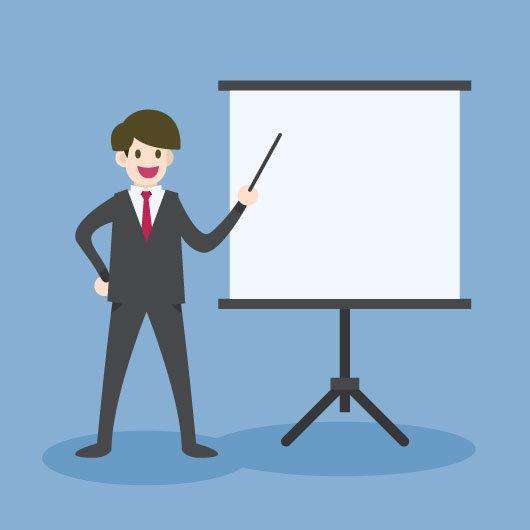When you land a job interview, you have plenty of reasons to rejoice. You've probably been selected from amongst a pool of hundreds of candidates, after all. However, you soon realise that the most difficult phase of the recruitment process is still ahead of you – giving an effective presentation in front of your potential employers.
But why are interview presentations so popular nowadays, and why exactly do we need them?

An increasing number of companies are not satisfied with just reading applicants' resumes and a short question and answer session. They want to test your skills and see if you're able to actually sell them. They want to see if you can convince potential clients or business associates with your presentation prowess.
This is why delivering a good presentation – and starting off on the right foot – during your interview is crucial. To help you do just that, I have put together a list of the 5 best ways to start an interview presentation.
1. Make a good first impression
As we all know, first impressions do matter. Research suggests that, during an interview, people will make up their minds about you in 15 to 30 seconds of the introduction. This is an oft-repeated advice but it makes sense and shouldn't be ignored.
When you go for a job interview, there are certain things that can set the tone for the entire presentation before you even open your mouth. If you keep these things in mind, you'll be able to make a favourable impression right from the beginning.
Dress well
The importance of crisp,
professional attire cannot be emphasised enough. Wear clothing that's comfortable and fits well.
Be early rather than late
It's much better to sit in the office twiddling your thumbs rather than anxiously willing the taxi to move and the traffic to clear. Make sure that you account for all possible delays and leave your home early.
Smile
It's important to walk into the room confidently and
smile. If you look comfortable and friendly, the panel members will respond positively to you.
Greet the panel members
Some people often forget to greet the interviewers properly. You need to step forward and greet them comfortably, shake their hands and make it a point to engage with them for a moment. Don't linger, though, because that might seem like you're trying to delay the presentation or are trying to flatter them.
Set up your presentation calmly
When asked to begin their presentation, some people get flustered and nervous. Make sure to keep your movements easy and calm as you open the presentation.
2. Pay attention to your voice
When you speak, it's important that your voice appears natural. Your recruiters might forgive some level of nervousness if your presentation is stellar, but if you speak in an overly formal tone or in a stilted language, they're not going to be impressed.
They might give you a couple of seconds to make sure you're comfortable, but if you don't find your natural rhythm, you're not going to be successful. The best way to start off your presentation is by speaking comfortably. You need to show them that you're in your element.

If you'd like to learn more about delivering presentations, why not take a look at how we can help?
Boost your presentation skills with our online courses.
RRP from $65 – limited time offer just $23.99
3. Have a good opening line
According to statistics, you only have 60 seconds to
grab the attention of your audience, which is a very small amount of time for such a vital and difficult task. This is why the very first sentence of your presentation is crucial if you want to make an impact. It's the hook that'll grab your audience's attention and keep them engaged.
Think about the following examples:
- "I say to you today, my friends, so even though we face the difficulties of today and tomorrow, I still have a dream."
- "Four score and seven years ago our fathers brought forth on this continent, a new nation, conceived in Liberty, and dedicated to the proposition that all men are created equal."
These are opening lines to two of the greatest speeches ever made, the ‘I have a Dream' speech by Martin Luther King and the Gettysburg Address by Abraham Lincoln. Both of them have a stunning impact and immediately grab your attention.
Just like in these examples, it's crucial to start off your interview presentation with a great sentence. Whether it's a quote, a stunning or unusual statistic, or even a humorous anecdote, the choice is completely up to you – but the aim is to make the panel members curious and intrigued.

4. Elaborate
You need to follow-up your starting sentence with a short explanation about your opening lines. This can be a story, or an elaboration on the statistics or facts you mentioned. One of the best examples of the story opening is the commencement address at Stanford given by Steve Jobs.
His opening line was a surprising fact.
"Truth be told, I never graduated from college, and this is the closest I've ever gotten to a college graduation."
By stating this, Jobs, who attained success by invention and innovation, immediately grabs your attention. He followed it up with a story, going on to explain,
"Today, I want to tell you three stories from my life. That's it, no big deal; just three stories... "
This is a great example of what a good beginning should be like.
5. Be concise
Although telling a story is a great way to elaborate on your opening line, it's very easy to get completely absorbed in storytelling. If you keep rambling on and on about quotes, statistics or personal stories, you'll never reach the end.
In fact, the longer you take to get to the point, the less likely it is that you'll get the job. The best opening is a short one, so try not to drag the start of your presentation for too long. Once you have your audience's attention, seamlessly move on to your point.
By following these tips, you'll be able to start off your presentation with a bang. The recruiters are already curious and engaged, willing to hear what you have to say. When you awaken this curiosity in them, you're effectively commanding their attention throughout the interview process.

If you'd like to learn more about delivering presentations, why not take a look at how we can help?
Boost your presentation skills with our online courses.
RRP from $65 – limited time offer just $23.99




























